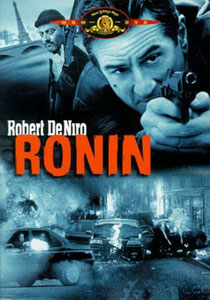You won’t find “Ronin” (1998) if you type “David Mamet” into your streaming device’s search function, since he used the pseudonym Richard Weisz. But when you watch the film, you know it’s a Mamet screenplay. This movie reminds me of “Heist” (2001) in that it shows a lot of details about how a theft is planned and executed, yet it’s primarily concerned with the thieves as people – and those people spout witticisms about the meaning of life even within tense sequences.
Last blast of old-school car chases
That’s where the similarities end. “Heist” is a fun film, worthy of smiles despite its violence; “Ronin” is comparatively dour, and it also becomes an incredible car-chase actioner in its bravura closing act. As much as Mamet’s fingerprints are on the screenplay – which builds from a story by J.D. Zeik, for whom this is by far his most notable credit — he probably didn’t have much to do with the old-fashioned, stunt-laden chase sequences.
The chases take us through the streets of Nice (which are far too narrow and loaded with fish and vegetable markets to be driven at any rate of speed) and onto France’s highways. Featuring almost no dialog as the heroes’ and villains’ cars weave through oncoming traffic, leaving crunched metal and explosions in their wake, the crisply edited highway sequence is the highlight of this late-career gem from director John Frankenheimer.

“Ronin” (1998)
Director: John Frankenheimer
Writers: J.D. Zeik, David Mamet
Stars: Robert De Niro, Jean Reno, Natascha McElhone
It’s one of the last great practical car chases prior to the onset of the “Fast and Furious” films, the car-action genre’s dominant franchise of the 21st century.
Considering how it ends – with a tense standoff at an ice-skating rink on the heels of the street action — “Ronin” starts quite slowly, with title character Sam (Robert De Niro) hiding a gun outside a restaurant near closing time. It’s the site of a pre-arranged meeting with his new heist teammates: Irish organizer Deirdre (Natasha McElhone), Frenchman Vincent (Jean Reno), German Gregor (Stellan Skarsgard) and another American, Larry (Skipp Sudduth).
This isn’t the set-up to a shootout, though. When they leave the restaurant for their headquarters — Sam having passed the initial tests — Sam retrieves the gun. He simply wanted to be prepared in case these people turned on him.
Trust and suspicion among criminals
“Heist” is about thieves who already know each other, but “Ronin” – wherein this group aims to steal a metal case from another group — is about the feeling-out process. Just looking to get a paycheck, Sam evokes the lonely masterless warrior referenced by the title, and we sense a potential romance with Deirdre and potential friendship with Vincent. I wonder if the latter might also be a “ronin,” as he and Sam share several knowing exchanges about the nature of their work.

While relationship beats are peppered here and there, the film’s focus is on the details of how to acquire a heavily guarded, desirable object, something we’ve seen in many Mamet films. “Ronin” gets particularly in the weeds, which will be a feature to some and a bug to others.
Sam and Deirdre run a reconnaissance mission to see how heavily guarded the metal case is. Sam arranges for a sign to fall to the sidewalk outside the hotel, making a sound similar to a gunshot, and observes how their enemies react to a potential threat. But no moves will be made at this time; this is about gathering information.
Sam’s questions about what’s in the case and who wants it and why it matters are dismissed as irrelevant by Deirdre, and I suspected early on that this would be a “Pulp Fiction” situation where we as viewers will never find out what’s in the case. But it’s interesting to note that even without answers, the journey toward the possibility of answers is compelling.
Old-fashioned in a good way
And frankly, I find it neat that a quality film can be structured around a core of nothingness. In addition to not knowing what’s in the case, we don’t know all that much about anyone in “Ronin.” All we know is how they interact with each other as friends, foes or unknown elements; how they go about their jobs and how good they are at their jobs; and how Sam sees the world after (presumably) years of doing this type of work.
Also, the French settings are marvelous under the lens of Robert Fraisse, and Elia Cmiral gives us some tense music when appropriate.
Old-fashioned in a good way, “Ronin” is an exercise in the art of grabbing an audience without giving us any irrelevant or clichéd details. Mamet masterfully shifts our focus to where he wants it to be. The only thing he fails at, ultimately, is hiding the fact that he wrote this movie.

